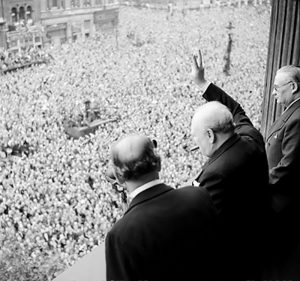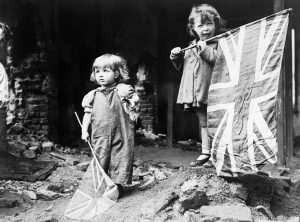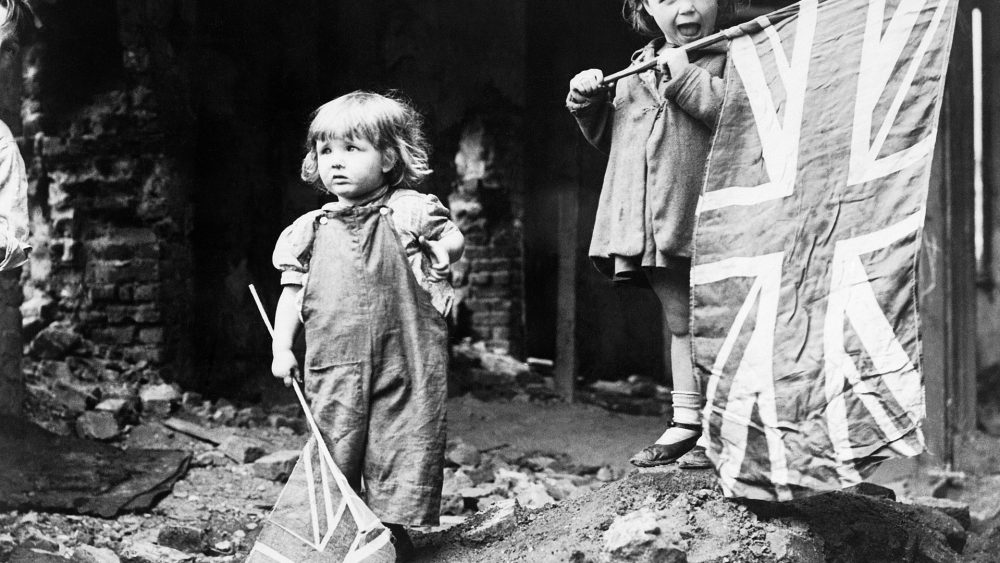Tuesday 8 May 1945, is widely known as Victory in Europe (VE) Day. Although the Second World War officially came to an end, not all Europeans celebrated the date. 8 May was experienced differently by people all over Europe. Most of them coped with everyday problems depending on the various situations they lived in: as a soldier of the German Wehrmacht or the Allied troops, as a housewife preparing a meal or living in an emergency shelter, as a survivor of the Holocaust in one of the liberated concentration camps or as a perpetrator who stood accused. Without personal documents we can only imagine what might have shaped people’s experiences of this day. But as far media coverage has been preserved, we can at least analyse what these people were told by the media of the time: reports by newspapers and the radio, news by broadsheets and loudspeakers that marked the end of the war. Of course, facts about the acceptance of the unconditional surrender of Germany’s armed forces by the Allies were inextricably interwoven with interpretations of what this event should mean for the contemporary readers, listeners and bystanders.
This is the first of three blog entries about the sonic traces of May 1945 in Britain, Germany and Sweden (authors Hugh Chignell, Hans-Ulrich Wagner and Marie Cronqvist) and the messages given by radio to the people who got in contact with them. They are radio sources from a victor, a loser, and a neutral. We consider such documents as relics of communicative processes in the past. This means that we consider them sources of past speaking and writing while looking for traces of past listening and reading historians lack so often.

Most historical accounts of Victory in Europe Day (VE Day) focus on London and the gathering of huge crowds around Buckingham Palace and Trafalgar Square – the traditional meeting places for celebrations in the capital. The celebrations had been triggered by Hitler’s assassination on 30 April followed by the complete surrender of German forces at 02.14 on 7 May. The following recording tells us little but its sheer mundane authenticity; the sound of repeated car horns, whistles and cheers somehow connects us to what must have been a day of great relief and joy.
VE Day Buckingham Palace (recording copyright BBC)
The BBC was not only central to celebrations and commemoration, it had earned that right over the last six years, and at 15:00 on 8 May it broadcast Churchill’s victory speech, ‘the evil doers now lie prostrate before us’. In Sian Nicholas’ definitive account of the BBC and the war she writes with authority of the tremendous success of VE Day broadcasts. After Churchill had been heard by 71% of the population (some listening to his words broadcast through loud speakers fixed to trees) Victory Celebrations was a programme designed to bring the London festivities to everyone in the land. Later that evening, with a certain inevitability, listeners were treated to a Tribute to the King featuring voices from around the Empire. The following week, J B Priestley, who had so brilliantly captured the public mood in the early years of the war was allowed to sound a note of caution warning that ‘the scene is grim and ruinous; and the journey must continue … Europe must be put together.’

The scenes of crowds wearing paper hats, shouting and singing would have been against a grimmer back drop. London a shattered city, like so many throughout Europe, everywhere blackened by fire, rubble in huge heaps, ominous gaps in rows of houses. The crowds sang but as one 50 year old man remarked, ‘It was just like this after the last war and twelve months later we was standing in dole queues.’
Further reading and listening: David Hendy’s article on VE Day the History of the BBC webpage
/ Hugh Chignell, Bournemouth

